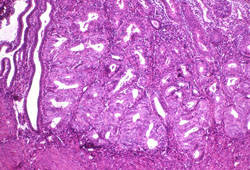Resumen
Definition
History and exam
Key diagnostic factors
- postmenopausal vaginal bleeding (PVB)
Other diagnostic factors
- uterine mass, fixed uterus, or adnexal mass indicating extrauterine disease
- abnormal menstruation or vaginal bleeding in a premenopausal woman
- pain (abdominal or pelvic) and weight loss
- symptoms of metastatic disease
- signs of metastatic disease
Risk factors
- overweight and obesity
- age >50 years
- endometrial hyperplasia
- unopposed endogenous estrogen
- unopposed exogenous estrogen
- tamoxifen use (postmenopausal women)
- insulin resistance
- family history of endometrial or colorectal cancer
- family history of breast cancer or ovarian cancer
- family history of Lynch syndrome (hereditary nonpolyposis colorectal cancer)
- family history of PTEN syndromes
- polycystic ovary syndrome
- radiation therapy
- inactivity
- diet
- nulliparity and infertility
Diagnostic tests
1st tests to order
- pelvic (transvaginal) ultrasound
- office-based endometrial biopsy (with or without office-based hysteroscopy) and histopathology
- hysteroscopy, dilation and curettage (D&C), and histopathology
- cervical cytology (liquid-based cytology or Pap smear)
- CBC
Tests to consider
- tumor molecular analysis
- genetic evaluation
- serum CA-125 level
- saline infusion sonohysterogram
- BUN and creatinine (renal function testing)
- LFTs
- chest x-ray
- CT scan of chest, abdomen, and pelvis
- MRI of uterus, pelvis, and abdomen
- PET/CT scan
Treatment algorithm
stage IA endometrioid carcinoma not considering fertility preservation
stage IA endometrioid carcinoma considering fertility preservation
stage IB or II endometrioid carcinoma
stages III to IV endometrioid carcinoma; all nonendometrioid carcinomas (high risk)
recurrent or incurable disease
Contributors
Authors
Alexander B. Olawaiye, MD, MRCOG, FACOG, FACS

Associate Professor
Division of Gynecologic Oncology
Department of Obstetrics, Gynecology, and Reproductive Sciences
Magee-Womens Hospital of UPMC
University of Pittsburgh School of Medicine
Pittsburgh
PA
Disclosures
ABO is on the scientific advisory board for AstraZeneca, GlaxoSmithKline, Clovis, and Genentech.
Richard T. Penson, MD, MRCP

Clinical Director
Medical Gynecologic Oncology
Division of Hematology Oncology
Massachusetts General Hospital
Boston
MA
Disclosures
RTP declares that his institution has received research funding from Array BioPharma Inc., AstraZeneca, Genentech, and Vascular Biogenics Ltd on his behalf. RTP has received research funding from Genentech Inc., ImClone Systems Inc., Endocyte Inc., AstraZeneca, Eisai Inc., Amgen Inc., and Vascular Biogenics Ltd. He has been paid for participating in scientific advisory boards for AbbVie, AstraZeneca, Baxalta Oncology, Clovis Oncology, Curio Science, Eisai Inc., Endocyte Inc., Genentech, Janssen Oncology (J&J), Merck & Co., Mersana Therapeutics Inc., NewLink Genetics, Nexus Global Group, Pieris Pharma Inc., Roche Inc., Sutro Biopharma, Syndax Pharmaceuticals, Tesaro Inc., and Vascular Biogenics Ltd. RTP was an expert witness for Aventis Pharma S.A. vs. Apotex Inc. in 2009. RTP has received royalties from: BMJ, Blackwell Publishing Medicine at a glance, and UpToDate Advance Medical: Second Medical Opinion.
Acknowledgements
Dr Alexander B. Olawaiye and Dr Richard T. Penson would like to gratefully acknowledge Dr Larissa J. Lee, their co-contributor who has sadly died, and to acknowledge Dr Neil S. Horowitz and Dr Anthony H. Russell, previous contributors to this topic.
Disclosures
NSH and AHR declare that they have no competing interests.
Peer reviewers
Susan A. Davidson, MD
Associate Professor/Chief
Gynecologic Oncology
S/M Obstetrics & Gynecology (UCD)
University of Colorado Health Sciences Center
Aurora
CO
Disclosures
SAD declares that she has no competing interests.
Svetlana Mironov, MD
Attending Radiologist
Assistant Professor of Radiology
Memorial Sloan-Kettering Cancer Center
New York
NY
Disclosures
SM declares that she has no competing interests.
Peer reviewer acknowledgements
BMJ Best Practice topics are updated on a rolling basis in line with developments in evidence and guidance. The peer reviewers listed here have reviewed the content at least once during the history of the topic.
Disclosures
Peer reviewer affiliations and disclosures pertain to the time of the review.
References
Key articles
National Comprehensive Cancer Network. NCCN clinical practice guidelines in oncology: uterine neoplasms [internet publication].Full text
Concin N, Matias-Guiu X, Vergote I, et al. ESGO/ESTRO/ESP guidelines for the management of patients with endometrial carcinoma. Int J Gynecol Cancer. 2021 Jan;31(1):12-39.Full text Abstract
Oaknin A, Bosse TJ, Creutzberg CL, et al. Endometrial cancer: ESMO clinical practice guideline for diagnosis, treatment and follow-up. Ann Oncol. 2022 Sep;33(9):860-77.Full text Abstract
Amant F, Mirza MR, Koskas M, et al. Cancer of the corpus uteri. Int J Gynaecol Obstet. 2018 Oct;143 Suppl 2:37-50.Full text Abstract
American College of Obstetricians and Gynecologists; Society of Gynecologic Oncology. Practice bulletin no. 149: endometrial cancer. Apr 2015 [internet publication].Full text
Reference articles
A full list of sources referenced in this topic is available to users with access to all of BMJ Best Practice.

Differentials
- Endometrial hyperplasia
- Endometrial polyp
- Endometriosis
More DifferentialsGuidelines
- NCCN clinical practice guidelines in oncology: uterine neoplasms
- Asymptomatic endometrial thickening in menopausal women
More GuidelinesPatient information
Hysterectomy
More Patient informationLog in or subscribe to access all of BMJ Best Practice
Use of this content is subject to our disclaimer